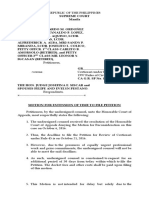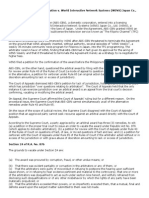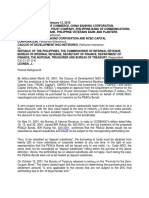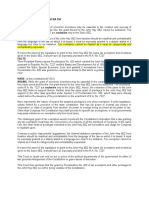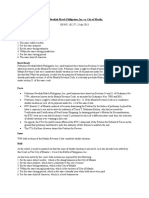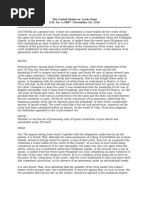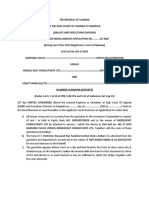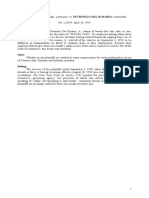Davao Gulf Lumber Corporation vs. CIR
Davao Gulf Lumber Corporation vs. CIR
Uploaded by
Bryce KingCopyright:
Available Formats
Davao Gulf Lumber Corporation vs. CIR
Davao Gulf Lumber Corporation vs. CIR
Uploaded by
Bryce KingOriginal Title
Copyright
Available Formats
Share this document
Did you find this document useful?
Is this content inappropriate?
Copyright:
Available Formats
Davao Gulf Lumber Corporation vs. CIR
Davao Gulf Lumber Corporation vs. CIR
Uploaded by
Bryce KingCopyright:
Available Formats
12. Davao Gulf Lumber Corporation vs.
CIR,
G.R. No. 117359, 23 July 1998
Doctrine
A tax cannot be imposed unless it is supported by the clear and express language of a statute; On the other hand,
once the tax is unquestionably imposed, a claim of exemption from tax payments must be clearly shown and based
on language in the law too plain to be mistaken. Section 5, RA 1435 as a tax exemption, must be construed
strictissimi juris against the grantee.
Recit Ready
Davao Lumber paid the specific taxes imposed under Sec. 153 and 156 of the 1997 NIRC and then filed before CIR
a Claim for Refund based on Insular Lumber Co. v. CTA and Sec. 5 of RA 1435 and complied with its procedure.
Petitioner was granted a partial refund based on the rates deemed paid under RA 1435. Petitioner insists that the
basis be the higher rate under NIRC. SC Decided RA 1435 does not explicitly provide that a refund under it may be
based on higher rates which were nonexistent at the time of its enactment, this Court cannot presume otherwise.
Facts
Davao Gulf Lumber Corporation, purchased from various oil companies refined and manufactured oils as well
as motor and diesel fuels for its exploitation and operation.
Selling companies paid and passed the specific taxes imposed under Sec. 153 and 156 of the 1997 NIRC to
petitioner as purchaser who in turn filed before CIR a Claim for Refund for P120, 825 representing 25% of the
specific taxes actually paid based on Insular Lumber Co. v. CTA and Sec. 5 of RA 1435 and complied with its
procedure.
Petitioner then filed before CA a Petition for Review: Favored petitioner to a partial refund P2,923 and based
on the rates deemed paid under RA 1435, not the higher rates actually paid under the NIRC.
Insisting that the basis be the higher rate, petitioner elevated the case to the CTA who affirmed the CA's
decision.
Issue
W/N the provision of the NIRC be the one used as basis for the refund. [No]
Decision
A tax cannot be imposed unless it is supported by the clear and express language of a statute; on the other hand,
once the tax is unquestionably imposed, "[a] claim of exemption from tax payments must be clearly shown and
based on language in the law too plain to be mistaken." Since the partial refund authorized under Section 5, RA
1435, is in the nature of a tax exemption, it must be construed strictissimi Juris against the grantee. Hence,
petitioner's claim of refund on the basis of the specific taxes it actually paid must expressly be granted in a statute
stated in a language too clear to be mistaken.
In this case, there’s no expression of a legislative will authorizing a refund based on the higher rates claimed by
petitioner in RA 1435 and the subsequent pertinent statutes. The mere fact that the privilege of refund was included
in Section 5, and not in Section 1, is insufficient to support petitioner's claim. When the law itself does not explicitly
provide that a refund under RA 1435 may be based on higher rates which were nonexistent at the time of its
enactment, this Court cannot presume otherwise. A legislative lacuna cannot be filled by judicial fiat.
Petitioner also asserts that "equity and justice demand that the computation of the tax refunds be based on actual
amounts paid under Sections 153 and 156 of the NIRC." We disagree. According to an eminent authority on
taxation, "there is no tax exemption solely on the, ground of equity."
You might also like
- Sample Petition For AnnulmentDocument6 pagesSample Petition For AnnulmentEdward Carino77% (43)
- 007 - First National Bank in Fort Collins v. RostekDocument1 page007 - First National Bank in Fort Collins v. RostekBryce King100% (2)
- Motion For Extension of TimeDocument4 pagesMotion For Extension of Timemakatipleb100% (2)
- Domingo Vs GarlitosDocument1 pageDomingo Vs GarlitosRon AceNo ratings yet
- Used Actually, Directly and Exclusively For Educational Purposes Shall Be Exempt From Taxes and DutiesDocument2 pagesUsed Actually, Directly and Exclusively For Educational Purposes Shall Be Exempt From Taxes and DutiesJasper Alon100% (2)
- Pepsi-Cola v. TanauanDocument2 pagesPepsi-Cola v. TanauanIshNo ratings yet
- Air Canada v. CIR DigestDocument2 pagesAir Canada v. CIR Digestpinkblush71780% (5)
- ABS V WINSDocument2 pagesABS V WINSAices SalvadorNo ratings yet
- Philex Mining Vs Cir DigestDocument3 pagesPhilex Mining Vs Cir DigestRyan Acosta100% (2)
- BDO Vs RepublicDocument4 pagesBDO Vs RepublicJeffrey Magada0% (1)
- G.R. No. L - 41383Document2 pagesG.R. No. L - 41383siahky100% (2)
- Pembinaan SPK SDN BHD V Jalinan Waja SDN BHDDocument13 pagesPembinaan SPK SDN BHD V Jalinan Waja SDN BHDSaipul BaharimNo ratings yet
- Davao Gulf Lumber Corp V CIRDocument3 pagesDavao Gulf Lumber Corp V CIRAiken Alagban LadinesNo ratings yet
- DE LA RIVA DigestDocument2 pagesDE LA RIVA DigestChristine Rose Bonilla LikiganNo ratings yet
- Tan Vs Del Rosario - Power of Taxation - CongressDocument2 pagesTan Vs Del Rosario - Power of Taxation - CongressprincessairellaNo ratings yet
- South African Airways v. CIR DIGESTDocument4 pagesSouth African Airways v. CIR DIGESTkathrynmaydevezaNo ratings yet
- Haulst Vs PR BuildersDocument8 pagesHaulst Vs PR Buildersfay garneth buscatoNo ratings yet
- 02 Soriano vs. Secretary of FinanceDocument1 page02 Soriano vs. Secretary of FinanceMark Anthony Javellana SicadNo ratings yet
- Tax Case Digest: PB Com V. CIR (1999) : G.R. No. 112024Document2 pagesTax Case Digest: PB Com V. CIR (1999) : G.R. No. 112024RexNo ratings yet
- CIR vs. St. Luke's Medical CenterDocument2 pagesCIR vs. St. Luke's Medical CenterTogz Mape50% (2)
- Philippine Health Care Vs CIRDocument1 pagePhilippine Health Care Vs CIRKim Lorenzo CalatravaNo ratings yet
- Commissioner of Internal Revenue, Petitioner, vs. Fortune Tobacco Corporation, RespondentDocument1 pageCommissioner of Internal Revenue, Petitioner, vs. Fortune Tobacco Corporation, RespondentJoshua Erik MadriaNo ratings yet
- Bordador v. Luz, 283 SCRA 374 (1997)Document3 pagesBordador v. Luz, 283 SCRA 374 (1997)Kent UgaldeNo ratings yet
- Orient Insurance V RevillaDocument3 pagesOrient Insurance V RevillaAilyn AñanoNo ratings yet
- BIR RulingsDocument4 pagesBIR RulingsAndrea RioNo ratings yet
- 5 Chavez Vs Ongpin - DigestDocument2 pages5 Chavez Vs Ongpin - DigestGilbert Mendoza100% (5)
- Eduardo R. Alicias, Jr. vs. Atty. Myrna v. MacatangayDocument2 pagesEduardo R. Alicias, Jr. vs. Atty. Myrna v. MacatangayMona LizaNo ratings yet
- Western Minolco v. CommissionerDocument2 pagesWestern Minolco v. CommissionerEva TrinidadNo ratings yet
- SuretyDocument2 pagesSuretyTeacherEliNo ratings yet
- Sps. Aggabao v. ParulanDocument3 pagesSps. Aggabao v. ParulandelayinggratificationNo ratings yet
- CIR Vs CTA DigestDocument2 pagesCIR Vs CTA DigestAbilene Joy Dela Cruz71% (7)
- CIR v. San Miguel CorporationDocument1 pageCIR v. San Miguel CorporationKym AlgarmeNo ratings yet
- Pfda Vs NavotasDocument1 pagePfda Vs NavotasbaijamNo ratings yet
- CIR vs. ST Lukes DigestDocument2 pagesCIR vs. ST Lukes DigestKath Leen100% (4)
- Cir Vs Phil American Accident InsuranceDocument2 pagesCir Vs Phil American Accident InsuranceFredrick Atienza100% (1)
- Taxation Reviewer On VATDocument10 pagesTaxation Reviewer On VATlchieSNo ratings yet
- Afisco Insurance Corporation v. CA 302 SCRA 1Document2 pagesAfisco Insurance Corporation v. CA 302 SCRA 1Kayee KatNo ratings yet
- Icard v. City Council of Baguio - JamerDocument2 pagesIcard v. City Council of Baguio - JamerRenzo JamerNo ratings yet
- AFISCO INSURANCE CORP Vs CADocument4 pagesAFISCO INSURANCE CORP Vs CAnelle sanNo ratings yet
- John Hay Sez v. Lim, 414 Scra 356Document1 pageJohn Hay Sez v. Lim, 414 Scra 356Scrib LawNo ratings yet
- CORPO 1st Assignment - Atty. LiberatoDocument248 pagesCORPO 1st Assignment - Atty. LiberatoRainbow cloversNo ratings yet
- RAMOS - Diaz Vs PeopleDocument5 pagesRAMOS - Diaz Vs PeopleRovi Kennth RamosNo ratings yet
- CASE 33 - British American Tobacco vs. Camacho - FrancesDocument3 pagesCASE 33 - British American Tobacco vs. Camacho - FrancesFrances Abigail BubanNo ratings yet
- (Digest) Chavez v. OngpinDocument1 page(Digest) Chavez v. OngpinHomer SimpsonNo ratings yet
- PILMICO v. CIRDocument2 pagesPILMICO v. CIRPat EspinozaNo ratings yet
- Pagcor Vs Bir DigestDocument1 pagePagcor Vs Bir Digesterlaine_francisco50% (2)
- Courage VS Commissoner of Internal Revenue DigestDocument3 pagesCourage VS Commissoner of Internal Revenue DigestCharles Roger Raya100% (1)
- Juan Luna SubdivisionDocument1 pageJuan Luna SubdivisionRobert QuiambaoNo ratings yet
- PAL Vs EDUDocument2 pagesPAL Vs EDUCamille Benjamin RemorozaNo ratings yet
- Pepsi Cola v. City of Butuan DigestDocument2 pagesPepsi Cola v. City of Butuan DigestAnonymous PbYTL9zzco100% (1)
- Boosey and Hawkes V Walt DisneyDocument3 pagesBoosey and Hawkes V Walt DisneyIvy Kristel GonzalesNo ratings yet
- G.R. No. 222837, July 23, 2018 LIM GAW JR. Vs CIRDocument12 pagesG.R. No. 222837, July 23, 2018 LIM GAW JR. Vs CIRJavieNo ratings yet
- Digested (TAX 1) - Phil Health Care Providers Vs CIRDocument2 pagesDigested (TAX 1) - Phil Health Care Providers Vs CIRChugsNo ratings yet
- 115 - SilkAir Vs CIRDocument8 pages115 - SilkAir Vs CIRCollen Anne PagaduanNo ratings yet
- LORENZO Vs POSADAS G.R. No. L-43082 June 18, 1937Document3 pagesLORENZO Vs POSADAS G.R. No. L-43082 June 18, 1937Francise Mae Montilla Mordeno100% (3)
- Supreme Transliner v. BPIDocument1 pageSupreme Transliner v. BPIWhere Did Macky GallegoNo ratings yet
- CIR V AcesiteDocument2 pagesCIR V AcesiteAleli Joyce BucuNo ratings yet
- Case Digest - Control Test - Grandfather Rule - EJANDocument8 pagesCase Digest - Control Test - Grandfather Rule - EJANJohren A. EjanNo ratings yet
- Delgado V Heirs of MarcianaDocument2 pagesDelgado V Heirs of MarcianaLance LagmanNo ratings yet
- CIR v. PLDTDocument2 pagesCIR v. PLDTKing Badong100% (1)
- DAVAO GULF LUMBER CORP V CIR DigestDocument2 pagesDAVAO GULF LUMBER CORP V CIR DigestRonnie Garcia Del RosarioNo ratings yet
- Davao Gulf Lumber Corporation VDocument1 pageDavao Gulf Lumber Corporation Vdeuce scriNo ratings yet
- Tax CaseDocument12 pagesTax CaseJohn AbellanidaNo ratings yet
- Davao Gulf Lumber Vs CIRDocument13 pagesDavao Gulf Lumber Vs CIRgsNo ratings yet
- Letter of Agreement RE-REVISEDDocument2 pagesLetter of Agreement RE-REVISEDBryce KingNo ratings yet
- Guidelines For Electronic Submission To Lower CourtsDocument3 pagesGuidelines For Electronic Submission To Lower CourtsBryce KingNo ratings yet
- SongbirdDocument4 pagesSongbirdBryce KingNo ratings yet
- SOM CasesDocument1 pageSOM CasesBryce KingNo ratings yet
- SorellDocument5 pagesSorellBryce KingNo ratings yet
- CrawmeraxDocument3 pagesCrawmeraxBryce KingNo ratings yet
- Chuch of The Divine TrinityDocument11 pagesChuch of The Divine TrinityBryce KingNo ratings yet
- Province of Abra vs. HernandoDocument2 pagesProvince of Abra vs. HernandoBryce KingNo ratings yet
- Make Sense? Oh, What Fun Is There in Making Sense?Document6 pagesMake Sense? Oh, What Fun Is There in Making Sense?Bryce King0% (1)
- Tiu vs. CADocument2 pagesTiu vs. CABryce KingNo ratings yet
- Progressive Development Corporation vs. Quezon CityDocument2 pagesProgressive Development Corporation vs. Quezon CityBryce King100% (1)
- Dacanay vs. Asistio, Jr.Document1 pageDacanay vs. Asistio, Jr.Bryce KingNo ratings yet
- Repeat of "11. CIR v. CTA", All Issues and Decisions Have Been Discussed in This Digest So Just Reposting. Thank You Steph! 3Document3 pagesRepeat of "11. CIR v. CTA", All Issues and Decisions Have Been Discussed in This Digest So Just Reposting. Thank You Steph! 3Bryce King100% (1)
- Swedish Match Philippines, Inc. vs. City of ManilaDocument2 pagesSwedish Match Philippines, Inc. vs. City of ManilaBryce KingNo ratings yet
- 7) Colgate Palmolive Philippines, Inc., vs. OpleDocument2 pages7) Colgate Palmolive Philippines, Inc., vs. OpleBryce KingNo ratings yet
- 2) Maternity Children's Hospital vs. Secretary of LaborDocument1 page2) Maternity Children's Hospital vs. Secretary of LaborBryce KingNo ratings yet
- A. Definitions 1. Absolute Privileged Communication Rule (5 Points)Document5 pagesA. Definitions 1. Absolute Privileged Communication Rule (5 Points)Bryce KingNo ratings yet
- 13) Lopez v. Bodega CityDocument2 pages13) Lopez v. Bodega CityBryce KingNo ratings yet
- 005 - US v. Look ChawDocument2 pages005 - US v. Look ChawBryce KingNo ratings yet
- 009 - Schmidt v. Driscoll Hotel, Inc.Document1 page009 - Schmidt v. Driscoll Hotel, Inc.Bryce KingNo ratings yet
- 003 - Liang v. PeopleDocument2 pages003 - Liang v. PeopleBryce KingNo ratings yet
- Karl Lentz Moonshine - 14Document428 pagesKarl Lentz Moonshine - 14robin88% (8)
- Record On Appeal SCOTUS FormatDocument1,650 pagesRecord On Appeal SCOTUS FormatSidney Powell100% (10)
- Jordan Letter To SlavittDocument4 pagesJordan Letter To SlavittJames LynchNo ratings yet
- Crim Law 1 AssignmentDocument1 pageCrim Law 1 Assignmentleahgarcesa5No ratings yet
- What Is Hamilton Thesis in Federalist 78Document6 pagesWhat Is Hamilton Thesis in Federalist 78Angelina Johnson100% (2)
- End of LitigationDocument14 pagesEnd of Litigationjasmin torionNo ratings yet
- STATON - Judicial Policy Implementation in Mexico City and MéridaDocument21 pagesSTATON - Judicial Policy Implementation in Mexico City and MéridaDaniel GOMEZNo ratings yet
- University Institute of Legal StudiesDocument62 pagesUniversity Institute of Legal StudiesnosheenNo ratings yet
- WP 10772 2024 Order 08-May-2024 DigiDocument2 pagesWP 10772 2024 Order 08-May-2024 Digianushkashrivastava878No ratings yet
- NMCC 24Document11 pagesNMCC 24Ananya ChakilamNo ratings yet
- Legal GK Facts Quiz 9Document6 pagesLegal GK Facts Quiz 9Amit SharmaNo ratings yet
- Davao Gulf Lumber Corporation vs. CIRDocument1 pageDavao Gulf Lumber Corporation vs. CIRBryce KingNo ratings yet
- Ex-Parte Motion For Issuance of Certificate of FinalityDocument3 pagesEx-Parte Motion For Issuance of Certificate of FinalitySaneng NengNo ratings yet
- James Brown Federal Criminal ComplaintDocument7 pagesJames Brown Federal Criminal ComplaintNational Content DeskNo ratings yet
- Middleeast Chamber SummonsDocument2 pagesMiddleeast Chamber SummonsfedwredNo ratings yet
- List of CasesDocument31 pagesList of Casesorganization mineNo ratings yet
- Motion For Reconsideration 1ST Draft Joel Libardo Et AlDocument9 pagesMotion For Reconsideration 1ST Draft Joel Libardo Et AlIsaac Joshua AganonNo ratings yet
- CSC Law Conduct Prejudicial To The Best Interest of The ServiceDocument17 pagesCSC Law Conduct Prejudicial To The Best Interest of The ServiceMarkus Aurelius83% (6)
- Appendix With Index PDFDocument2,245 pagesAppendix With Index PDFSidney Powell100% (5)
- Advanced Internet Technologies, Inc. v. Google, Inc. - Document No. 16Document1 pageAdvanced Internet Technologies, Inc. v. Google, Inc. - Document No. 16Justia.comNo ratings yet
- Tuuci v. Fiberbuilt UmbrellasDocument35 pagesTuuci v. Fiberbuilt UmbrellasPriorSmartNo ratings yet
- Civil Case Digest NotebookDocument401 pagesCivil Case Digest NotebookHarrison sajorNo ratings yet
- Chapter 1 RosenbloomDocument37 pagesChapter 1 RosenbloomAmna ChNo ratings yet
- Screenshot 2024-04-25 at 9.13.44 AMDocument32 pagesScreenshot 2024-04-25 at 9.13.44 AMThabang LebusaNo ratings yet
- PDF English legal system 2009 2010 8th ed Edition Gary Slapper downloadDocument81 pagesPDF English legal system 2009 2010 8th ed Edition Gary Slapper downloadlabrokjenesNo ratings yet
- General Vs UrroDocument2 pagesGeneral Vs UrroNeil Mayor100% (1)
- Montano Vs Insular Govt DigestDocument2 pagesMontano Vs Insular Govt DigestCarmina GalosNo ratings yet


